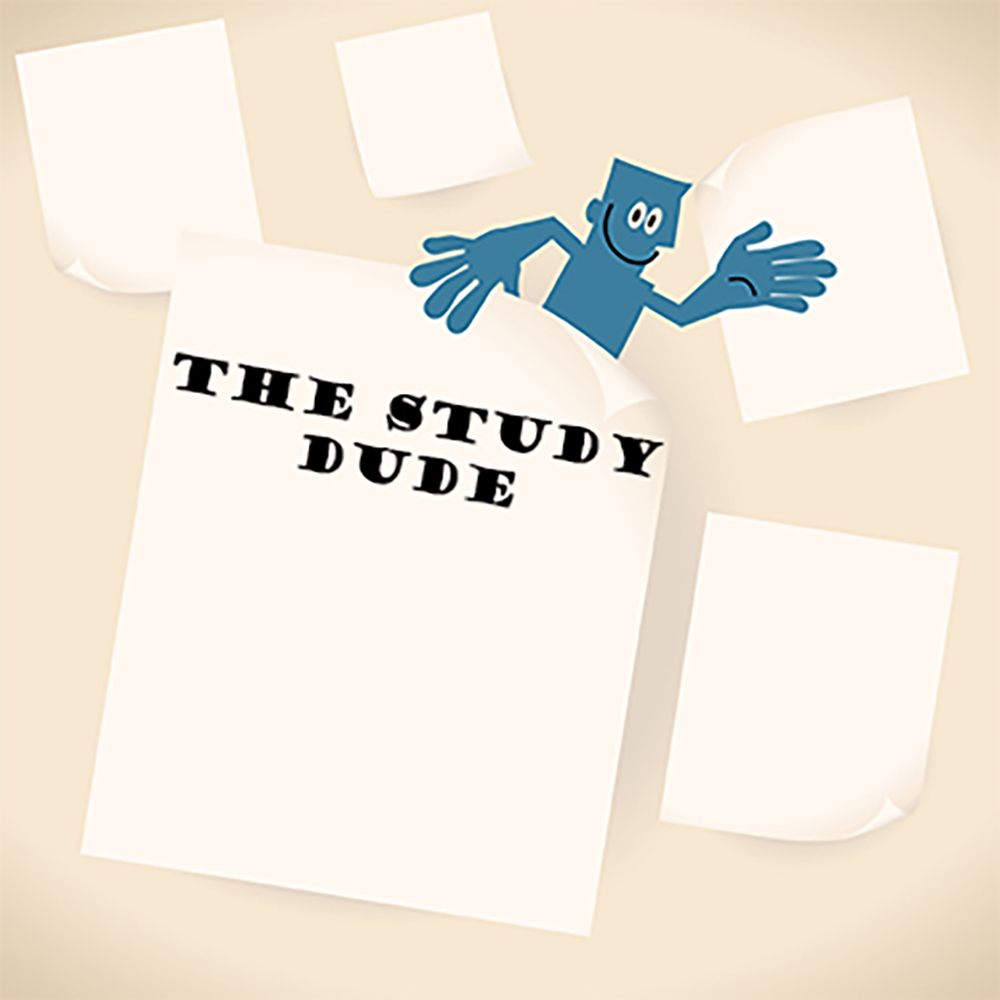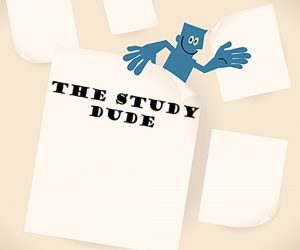 There is nothing more that The Study Dude wants than for you to always cherish your self-worth and growth potential, especially if you are a student with ADHD, a learning disability, or any other kind of disability. You are powerful role models with powerful insights on overcoming marginalization, should you ever wish to share them.
There is nothing more that The Study Dude wants than for you to always cherish your self-worth and growth potential, especially if you are a student with ADHD, a learning disability, or any other kind of disability. You are powerful role models with powerful insights on overcoming marginalization, should you ever wish to share them.
Well, in these articles, as The Study Dude, I’ll try to give you the study tips you need to help make your learning easier. I’ll also give you straight and honest opinions and personal anecdotes?even the embarrassing ones that you wouldn’t ever dare read about from any other study tip guru.
Today’s study tips are based a reading of the book Learning Outside the Lines: Two Ivy League Students with Learning Disabilities and ADHD Give You the Tools for Academic Success and Educational Revolution by Jonathan Mooney and David Cole.
Disability Considerations
I developed an energy-sapping anxiety condition during the final stint of the Master of Arts program while working full-time. Although avoidance is not considered a strategy for managing anxiety and other conditions, I find that sometimes gearing your education and work-life so that they fit better with your passions and strengths is a win-win strategy. Jonathan Mooney and David Cole (2000), former students with a learning disability and ADHD, respectively, corroborate this view.
A friend of mine had severe test anxiety and tried to find as many classes as possible that didn’t rely on heavy grade weightings for the exams. While the majority of psychologists would say that gradually confronting fears head-on is one of the best strategies for overcoming anxiety, I’m not as quick to believe this mainstream convention.
Here are some great strategies for making your education fit your strengths, whether you have ADHD, a learning disability, anxiety, or any other type of condition:
– Ensure that you have all the disability accommodations that meet the criteria of your particular condition. For instance, extra exam time or the ability to postpone an exam if you have a full-blown panic attack before the exam even starts. Make sure everyone is aware of your accommodations prior to going to the exam.
– Aim for project based learning if exams are challenging for your particular disability. Doctors and nurses, while also heavily exam based, offer a lot of practicum and internship opportunities. Request to do an alternative project based assignment in place of an essay or exam. Explore creative arts classes, writing classes, science classes, or speech classes that emphasize “doing” as opposed to taking exams or writing essays.
– Think of those times when you were most passionate about learning and try to get courses that invoke those responses most similarly. Don’t worry as much about grades, but think about where your heart was at its peak in terms of passion.
– Pitch a proposal for an independent study and see if a professor will supervise your endeavour. This is a great way to individualize a course so that it meets your desires most spot-on.
– Although I never heard of this ever occurring, why not design your own major and pitch it to the officials to see if you can forge ahead with it. You can select a hodgepodge of courses and cater them to your learning interests.
(Mooney & Cole, 2000)
The Study Dude is most passionate about learning when watching instructional videos on Adobe software, but alas, Athabasca doesn’t offer a creative arts program. However, it might be possible to pitch a directed study that utilizes creative Adobe software for a task such as, say, instructional design (another passion of mine).
Why and How to Review an Exam
The Study Dude never once reviewed an exam other than to pinpoint what went wrong and to redo the question. However, after reading Mooney and Cole’s (2000) book Learning Outside the Lines, I found some very fascinating reasons why you should always review your exams–surprising reasons I never would have otherwise even fathomed looking for.
So as not to delay the good stuff, here they are:
– Inspect test structure and how each component is evaluated. The structure will assist you in how to approach exam content studies for the next examination period.
– Determine whether the questions are largely or partially taken from lectures as opposed to readings. This will give you a better sense of where to especially focus your attention when doing your nightly homework.
– Determine the questions you got right and what method you used for studying for them. This is an indicator of what study approaches are most savvy for your particular needs.
– See what you got wrong and determine what study habits led to the lower performance in those areas. Determine how you can approach similar types of questions in the future. Go to the index of your book, look up the subject matter for that question, and be sure to review.
– Find out which types of exam questions (i.e., multiple choice, essay exams, short answer, true and false) you were weakest and strongest on, and strategize a means to improve the areas where you have shortcomings. For instance, if essay questions leave you with lower marks, create strategies for how you can better create an outline in the first few moments of the exam and how you can better structure formulaically the paper.
(Mooney & Cole, 2000)
The Study Dude never thought to review the exams other than to figure out the right answer for any wrong answers made. However, the above strategy is excellent for familiarizing yourself with the types of information you’ll need to know and the resources you will need to spend the most time examining.
Reading and Problem Solving for the Soft and Hard Sciences
The Study Dude was the highest performer in most of the university math classes I’d taken. However, I tackled the problems over-and-over again?perfecting them?without getting enough context. As a result, years later, I have, shamefully, forgotten even how to do the most rudimentary math tasks and can hardly describe in words what a derivative and an integral are.
Yet, The Study Dude wants there to be a light at the end of the tunnel for all of you scientific types.
Here are some tips for how to handle science related problems:
– Look over your study questions in detail before reading the actual text. Read the directions carefully and underline any action words and highlight any key words (usually boldface or italicized or in a chapter end list of terms).
– Skim your notes for an overview of the subject, keeping an eye out to highlight any additional key words that you become aware of.
– Take these key words and look them up in the glossary, index, and table of contents, then read two of the paragraphs above and below the paragraph itself as well.
– Read the intro and conclusion of the chapter, keeping your eye out for the key words, and get a sense of the overall content.
– Peruse as much of the chapter as you need to be able to get a sense of mastery on the subject.
– Go back and answer the study questions.
(Mooney & Cole, 2000)
The Study Dude found another eBook on how to study math, and the gist of that book was to understand the context of each mathematical application. The above approach will help you to get a good sense of what is needed to solve the relevant chapter problems without spending a lifetime pouring over the textbooks, although if, and only if, you have the time, The Study Dude recommends reading every word.
So, there’s nothing to fear. The Study Dude is determined to make right for you all the wrongs I made in grad school?one A+ at a time.
References
Mooney, Jonathan, and Cole, David. (2000). Learning outside the lines: Two Ivy league students with learning disabilities and ADHD give you the tools for academic success and educational revolution. New York, NY: Fireside.
